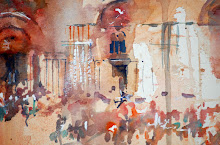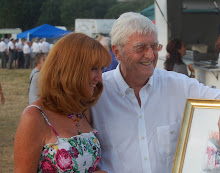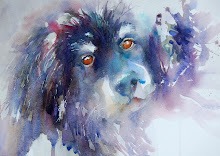The White Drake
Joseph Crawhall
Around 1895
Around 1895
Yesterday I had the opportunity to visit The Glasgow Boys Exhibition at the Royal Academy in London. I had a very personal reason for wishing to go as not so long ago I had been presented with an Art Critic Award by Anthony J Lester. After the presentation I was told my work reminded him of watercolours by the artist and Glasgow Boy, Joseph Crawhall. At that time I had never heard of this artist but immediately looked into his life and paintings. Since then I have become obssessed with seeing an original by this inspirational artist .
Walking into the rooms that held the exhibition was a moment I will never forget.The heady feeling of anticipation, understanding immediately that you were surrounded by incredible art, masterpieces that held links to life in days long ago were evident. A never ending amount of technique, colour and composition providing lessons which could take a lifetime to fully take in met my eyes. Having the mind of an artist to absorb information and the ability to appreciate the talent is a gift I never take for granted. I will need to return as I will see something new each time I visit.
The amazing brushwork, use of colour to portray each scene such as the funeral where only men would have attended holding their caps in their hands paying respects contrasting with the expressive children playing five stones. A game probably long forgotten by many. Will we paint our grandchildren playing on computers? Will that be as interesting to observe in the future? I doubt it. A romantic period has long gone to the artist. A period where beauty was in culture,clothing and simple pastimes. I loved a beautiful coastal scene where the glowing sunset had turned one cottage wall pink in the distance. A woman was gathering in her washing and you could make out subtle smoke drifting into the sky from the chimney pots. Tumble dryers were not in existence then and the attractive scene again held my fascination. A tennis court painting was out of this world where costumes and old rackets were so beautifully and masterfully caught taking the viewer back to yesteryear so effortlessly. A horse in a forge again reminded me of the days seen in films where cars were never in sight, roads often were country lanes and villages were communities where people knew each other. The painting titled "Ropewalk" gave an insight into life as a woman made rope with her bare hands. How hard times were but there is a sense of love in many of these scenes. Emotions evident in what the artist was trying to portray. I wonder if they realized how much they were giving via their art.
I quietly looked around the room and realized there wasn't one person in it I would wish to capture in watercolour.The clothes of today don't seem to lend themselves as readily to scenes like these.
This is not just an exhibition of beautiful art by masters. This is a record of history. Of periods changing, costumes, how women were hindered at times in the clothing they wore, how men worked, how children played without the use of computers, how poverty effected lives, how modern industry changed art by subject matter, how Asian influences came into play, how strong colour created atmosphere from the times people lived in, from travelling to Europe and combining not only scenery but technique.
I could write for hours but I would prefer everyone could witness for themeselves this incredible exhibition.
My reason for going was to see Jospeh Crawhalls work and I wasn't disappointed. But what I have learned is really incredible in that Anthony J Lester when he first saw my watercolours had no idea that I had lived in Asia. He awarded me the Art Critic Award in 2009 for a collection of my cockerel paintings and later explained why I had been chosen. At the time I was thrilled. But only now after seeing Crawhalls work do I fully understand what he may have seen and why he felt there was a connection.
I base my work from observations from life, I study all my subjects carefully on location. I have lived in ASia, studied art for a brief period in Japan but mainly studied Chinese Brushwork from a Shanghainese master whilst living in China. This period did influence my technique strongly. I feel a connection in how I use my brush but the play of light and use of space by Crawhall actually is very close to what I aim for when I paint.
I read this description from The National Galleries of Scotland and felt even closer to this artist. Considering I have never seen his work before there really is strong similarities in how we both work and I so wish I could have met him.
"The white drake combines Crawhall's detailed observation with his strong sense of formal design. He captured the play of dappled light across the bird's feathers and used the meadow grass to help define the space. The daisies and dandelions contribute both to the sense of recession and to the composition's decorative character, creating a rich surface pattern. Crawhall tended to work from memory and imagination, but based his work on his intense observations from life. His interest in Japanese prints and Chinese wash drawings on silk inspired watercolours like this one, which is painted on linen."
There is one watercolour in the show that will always stay in my mind but now I am sure you wish to look at his work and see for yourself how wonderful he was. Please take time to look up the Glasgow Boys and see their paintings.They are inspirational on so many levels. Think about life when they were alive and look at how that time fell into their subject matter and technique. It is thought provoking in that I wonder how in years to come viewers will look at paintings from today and feel a connection with history and art at our time. This is serious food for thought.
We can only aim to be as good as the artists we admire. I am a firm fan of the Glasgow Boys and I am inspired on so many levels to create paintings that speak as theirs did to me.
It is time to paint.
***********************


























No comments:
Post a Comment